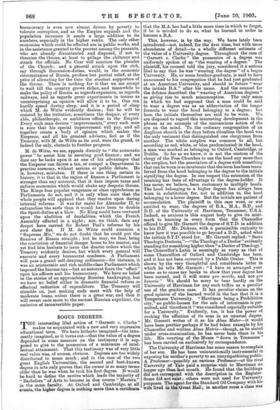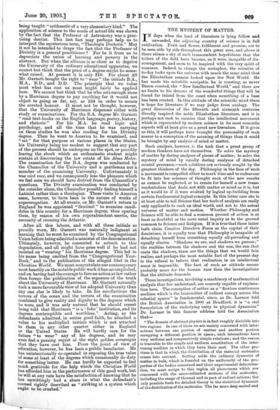BOGUS DEGREES. that the M.A. has had a little more
time in which to forget, if he is minded to do so, what he learned in order to become a B.A.
This, however, is by the way. We have lately been introduced—not, indeed, for the first time, but with more abundance of detail—to a wholly different estimate of the value of a University degree. Throughout the case of "Garnett v. Clarke" the possession of a degree was uniformly spoken of as "the wearing of a degree." The plaintiff, his counsel told the jury, considered it a serious libel to say that he was "wearing the degree" of a bogus University. He, or some brother-graduate, is said to have announced to his congregation that he had just graduated at an American University, and should in future "wear the initials B.A." after his name. And the counsel for the defence described the "wearing of American degrees" as giving rise to much misconception. The only sense in which we had supposed that a man could be said to wear a degree was as an abbreviation of the longer formula to wear the hood belonging to a degree ; but here the initials themselves are said to be worn. We are disposed to regard this interesting development in the phrase as an example of the unconscious action of the eye on the mind. To the ordinary congregation of an Anglican church in the days before ritualism the hood was the only vestment that distinguished one clergyman from another. The white surplice was common to all, but according as red, white, or blue predominated in the hood, a man was marked as belonging to Oxford, Cambridge, or Dublin. So far as we know, it is not the custom of the clergy of the Free Churches to use the hood any more than the surplice, but the association of a degree with something that can be worn is so inveterate that the term has been trans- ferred from the hood belonging to the degree to the initials signifying the degree. In one respect this extension of the meaning has been of advantage to the degree-holder. It has never, we believe, been customary to multiply hoods. The hood belonging to a higher degree has always been worn in substitution for, not in addition to, the hood belonging to a lower degree. But the initials are patient of accumulation. The plaintiff in this case wore, or was entitled to wear, the degrees of B.A., B.D., and D.D. of the University of Harriman, Tennessee, U.S.A. Indeed, so anxious is this august body to give its mint- mark to learning in every form that the Chancellor offered to give Mr. Garnett the degree of S.T.D. in addition to his D.D. Mr. Dickens, with a permissible curiosity to know how it was possible to go beyond a D.D., asked what the initials S.T.D. stood for. Mr. Garnett replied: "Sacra Theologia Doctolis,"—" the Theology of a Doctor" evidently standing for something higher than "a Doctor of Theology." The Chancellor's Latin is seemingly as rusty as that of some Chancellors of Oxford and Cambridge has been, and it has not been corrected by a Public Orator. This is shown by the very thoughtful and considerate letter in which he tells Mr. Garnett : "I have so arranged your name as to cause my books to show that your degree has been earned, and it will come pro merit°, and not pro konoris." We should be sorry to bear hardly on the University of Harriman for any such trifles as a peculiar use of the genitive case. It has peculiar claims on the good opinion of the learned world in the fact that it is a Temperance University. "Harriman being a Prohibition city," no public-houses for the sale of intoxicants is per- mitted, and therefore it "was considered especially suitable for a University." Evidently, too, it has the power of evoking the affection of its sons in an unusual degree. Mr. Garnett writes of it as his Alma Mater—it would have been prettier perhaps if he had taken example by his Chancellor and written Alma Matris—though, as he stated under cross-examination, he has never been there in his life. His courting of the Muses "down in Tennessee" has been carried on exclusively by correspondence.
The University of Harriman has some reason to complain of her son. He has been unintentionally instrumental in exposing his mother's poverty to an unsynapathising A Professor—possibly an envious Professor—at the rival University of Yale paid a surprise visit to Harriman no longer ago than last month. He found that the buildings did not correspond with the description in the Register. Some did not exist ; others were not used for University purposes. The agent for the Standard Oil Company with his wife lived in the Great Hall; in another room a class was being taught "arithmetic of a very elementary kind." The application of science to the needs of actual life was shown by the fact that the Professor of Astronomy was a prac- tising dentist. This last fact may perhaps help us to interpret the mysterious term, " Theologia Doctoris." May it not be intended to drape the fact that the Professor of Divinity is a general practitioner ? Far be it from us to depreciate the union of learning and poverty in the abstract. But when the alliance is so close as to deprive the University of the ordinary educational apparatus, we cannot but think that the price of a degree might be some- what raised. At present it is only $10. For about £8 Mr. Garnett bought the right to " wear " the initials B.A., M.A., B.D., and D.D. The principle that we value most what has cost us most might fairly be applied here. We cannot but think that he who sets enough store by .a Harriman degree to pay anything for it would not object to going as far, say, as $24 in order to secure the coveted honour. It must not be thought, however, that the University of Harriman dispenses either with study or examinations. For the B.A. degree Mr. Garnett "read text-books on the English language, poetry, history, and rhetoric." For his M.A. he read logic and psychology, and all the time that he was carrying on these studies he was also reading for his Divinity degree. Then he went to America to be examined, and " sat " for that purpose at various places in the States, his University being too modest to suggest that any part of the process should be undergone on the spot, or possibly fearing the shock which an enthusiastic student might sustain at discovering the low estate of his Alma Mater. The examination for the B.A. degree was conducted by the Chancellor of the University and a gentleman not a member of the examining University. Unfortunately it was vivd voce, and. we consequently lose the pleasure which we feel sure we should have derived from the Chancellor's questions. The Divinity examination was conducted by the outsider alone, the Chancellor possibly feeling himself a Latinist rather than a theologian. These visits to America seem, however, to have been in the nature of works of supererogation. At all events, on Mr. G-arnett's return to England he was appointed " Sentinel " to examine candi- dates in this country for a Harriman degree, thus sparing them, by reason of his own superabundant merits, the necessity of crossing the Atlantic.
After all this labour, and with all these initials so proudly worn, Mr. Garnett was naturally indignant at learning that he must be examined by the Congregational Union before being admitted a minister of the denomination. Ultimately, however, he consented to submit to this degradation, and all might have gone well if he bad not insisted on " wearing " his Harriman degree. This led to his name being omitted from the "Congregational Year- Book," and to the publication of the alleged libel in the Christian World. We must congratulate our contemporary most heartily on the notable public work it has accomplished, and on having had the courage to face an action at law rather than forego the publication of the exposure of the truth about the University of Harriman. Mr. Garnett naturally took a more favourable view of his adopted University than any one else is likely to take. In his recollections the terrors of the ocean and the terrors of the examination combined to give reality and dignity to the degrees which he wore, and it was only natural that he should resent being told that Harriman "is a 'fake' institution, and its degrees contemptible and worthless." Acting, as the defendants admitted, in entire good faith, he attached a value to his multiplied initials which is not attached to them in any other quarter either in England or the -United States. He will hardly care for the future "to wear" any of his degrees, and he may even feel a passing regret at the eight golden sovereigns that they have cost him. From the point of view of education, however, he has been a public benefactor. He has unintentionally co-operated in exposing the true value of some at least of the degrees which occasionally do duty for something better. He can hardly be expected to feel much gratitude for the help which the Christian World has afforded him in the performance of this good work, but he will at any rate have the satisfaction of knowing that he has unwittingly had a share in what the defendant's counsel rightly described as "striking at a system which ought to be crushed."











































 Previous page
Previous page